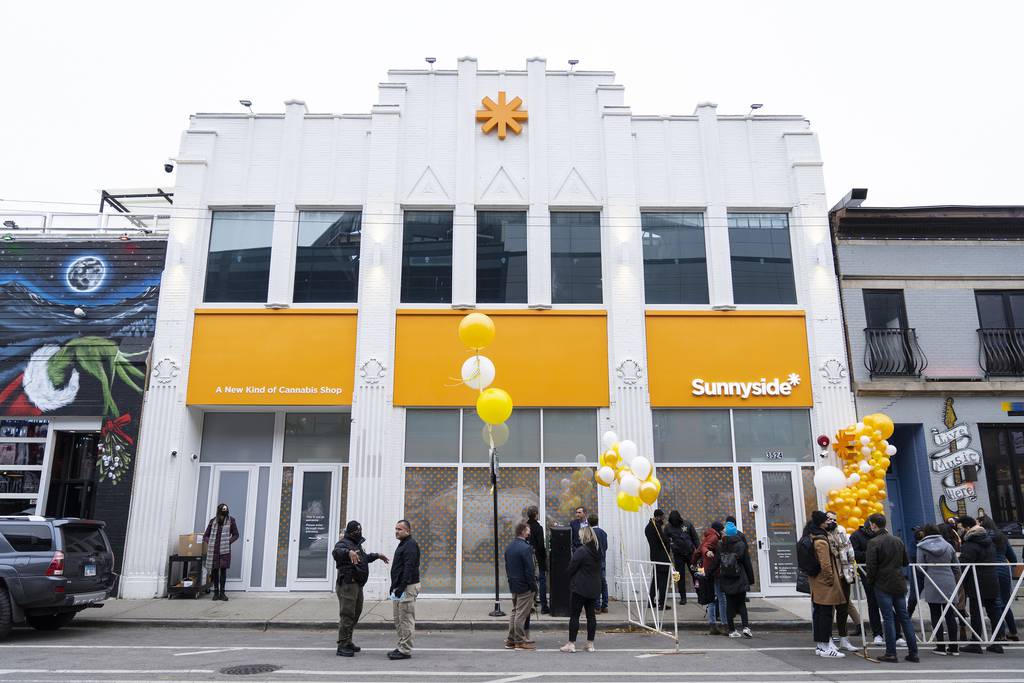Cresco Labs’ flagship Sunnyside recreational marijuana store, a block south of Wrigley Field, is pictured during its grand opening Monday, Nov. 15, 2021.
Chicago-based Cresco Labs and Columbia Care called off their $2 billion cannabis megamerger Monday, citing “evolving” market conditions that include falling stock prices, tightening credit and flattening industry sales.
The companies also scratched the $185 million sale of cannabis facilities in Illinois, New York and Massachusetts to rapper/producer Sean “Diddy” Combs, which were part of required antitrust divestitures for the merger.
“In light of the evolving landscape in the cannabis industry, we believe the decision to terminate the planned transaction is in the long-term interest of Cresco Labs and our shareholders,” Cresco CEO and co-founder Charles Bachtell said in a joint news release.
Announced in March 2022, the proposed all-stock merger would have created the No. 2 cannabis retailer in the U.S. with projected annual sales of more than $1.4 billion. Batchell said at the time the combined company’s brand portfolio would become “the Miller High Life, Coca-Cola and Johnnie Walker Blue Label of the cannabis industry.”
But stock prices for both companies have tumbled in a more challenging economic environment for the maturing cannabis industry. Cresco’s share price has fallen by nearly 75% to about $1.57 per share, while Columbia’s is down more than 80% to about 42 cents per share in the 16 months since the deal was announced.
Meanwhile, the cannabis credit market has gotten significantly tighter in the wake of rising interest rates and regional bank collapses.
While cannabis is legal in 40 states, including 23 that allow for recreational use, it is still a federally-controlled substance, which makes it difficult for companies to secure funding. The SAFE Banking Act, which addresses cannabis banking issues, remains stalled in Congress.
Founded in 2013, Cresco is in 10 states with 14 production facilities and 68 dispensaries, which operate under the Sunnyside banner. In Illinois, Cresco has 10 retail dispensaries — the maximum allowed by the state — and three manufacturing facilities in Joliet, Kankakee and Lincoln.
New York-based Columbia Care, which started as a medical-only operator 11 years ago, has grown into one of the largest multistate cannabis companies in the U.S. with 94 dispensaries and 32 cultivation facilities in 16 markets.
“After careful consideration, we are confident in the mutual decision to move forward as separate, standalone companies,” Nicholas Vita, CEO and co-founder of Columbia Care, said in the news release.
Merging Cresco with Columbia Care would have created a cannabis cultivation and retail giant with over 180 stores across an 18-market footprint, but also required divestitures to pass muster with federal regulators.
In November, the companies announced rapper/producer Combs had agreed to buy nine cannabis retail stores and three production facilities in Illinois, New York and Massachusetts for $185 million as part of required antitrust divestitures. The deal to sell off a portion of the combined portfolio to Combs included Cannabist dispensaries in Villa Park and Chicago’s Jefferson Park neighborhood, as well as a Columbia Care production facility in Aurora.
The Combs deal was terminated Friday, the companies said.
Cresco generated record revenue of $843 million last year, but has struggled to turn a profit, recording a net loss of $215 million. In 2023, first quarter revenue was down more than 9% year-over-year to $194 million, with a net loss of $28 million.
Illinois legalized recreational marijuana in January 2020, and ranks third in the nation behind California and Michigan in total sales, with revenue driven in part by the highest retail prices in the country, according to cannabis research firm Headset.
But after ramping up rapidly, sales are beginning to flatten in Illinois. Last year, recreational cannabis sales topped $1.55 billion, up 12.6%. In 2023, recreational sales were at $784 million through the first six months, slowing down to a 4.5% year-over-year increase, according to state data.
Illinois has 138 licensed recreational cannabis dispensaries.



